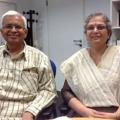34. The Truth Shall Set You Free: Nyāya on the Mind
Posted on
Nyāya proposes that each of us has both a self and a mind, in addition to the body.
Themes:
Further Reading
• A. Chakrabarti, “I Touch What I Saw,” Philosophy and Phenomenological Research, 52 (1992), 103-16.
• K.K. Chakrabarti and C. Chakrabarti, “Towards Dualism: The Nyāya-Vaiśeṣika Way,” Philosophy East and West 41 (1991), 477-91.
• S. Chennakesavan, The Concept of Mind in Indian Philosophy (London: 1960).
• J. Tuske, “Being in Two Minds: The Divided Mind in the Nyaya-sūtras,” Asian Philosophy 9 (1999), 229-38.
• J. Ganeri, The Self (Oxford: 2012), chapters 12-16.







Comments
Bridges
I was excited for Nyaya since you mentioned them in the first couple episodes, and they did not disappoint. I'm surprised there have been no Nyaya related comments until now!
Anyways, so i noticed that the external senses act as a sort of bridge between the mind and the body. Does attention act as a kind of bridge between self and mind? For the Nyaya, does the self have any direct link to the body, or is it all mediated through the mind? Also, the fact that we have no memory from one life to the other seems like a compelling argument (for one that believes in reincarnation) for the seperation of self and mind. Did they use this arguement?
In reply to Bridges by Alexander Johnson
Mind in Nyāya
As it happens I was just re-reading our discussion of this for the publication of the book version. On my understanding at least, "mind" (manas) is for them like an internal sense organ so it is actually the subject that directs attention and also perceives internal states, as external sensation perceives external things. So I think attention is just a function of the mind, it is not a distinct connection between self and mind, or whatever, and it is directed to things like feelings of pain, memories, etc. The mind is thus also distinct from the self (ātman) which is the ultimate subject of consciousness in general, as already established in the Upanishads, and it is the guarantor of identity across lives. I don't know of a text where they argue explicitly that memories must be external to the self for the reason you mention but I think that does make sense.
Purva mimamsa
Sir, I delighted when I have gone through subjective matters inner thoughtful themes. Truly, extremely exonerated. Thanking YOU fully.
Add new comment